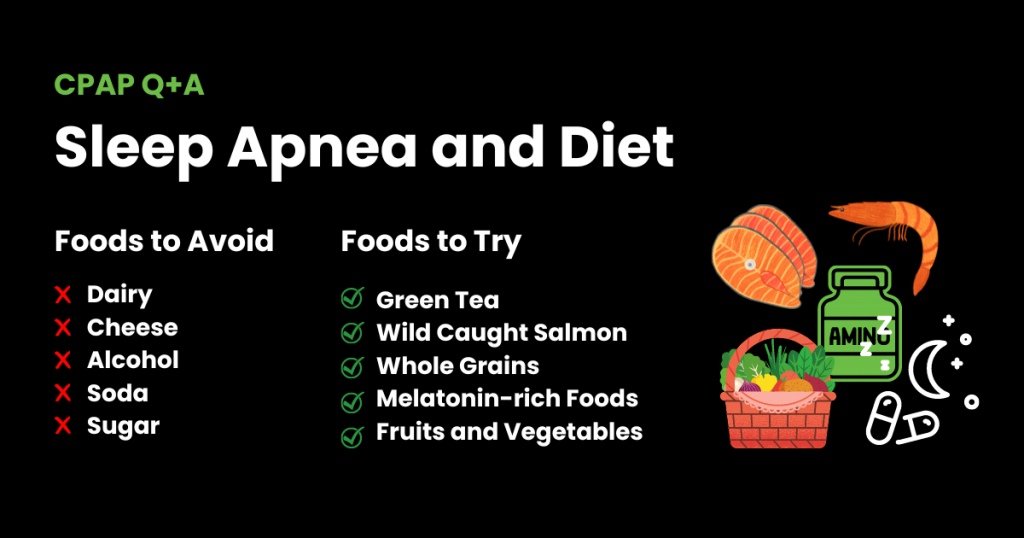
💡 Key Takeaways
- Avoid Dairy and High-Fat Foods: Consuming dairy and high-fat foods like whole milk and fatty cheese can trigger or worsen mucus production, making it difficult for you to breathe while sleeping.
- Limit Alcohol and Sugary Drinks: Although alcohol may help you fall asleep faster, it negatively impacts the quality of your sleep. Sugary drinks like soda can also disrupt your sleep due to their high caffeine and sugar content.
- Incorporate Fruits and Vegetables: Low in calories and fat, fruits and vegetables are rich in nutrients like vitamins C and E that can improve your sleep quality and breathing.
- Opt for Omega-3 Fatty Acids: Foods high in Omega-3 fatty acids, such as salmon and mackerel, can increase your body’s production of melatonin, improving your sleep and reducing the risk of heart disease.
- Choose Whole Grains Over Refined Carbs: Whole grains can speed up your metabolism and help you lose weight, which is beneficial for managing Obstructive Sleep Apnea (OSA).
If you’re living with sleep apnea, you might have noticed that some nights are better than others, and the only real difference in routine is what you ate during the day or before bed. While changing your diet can reduce your symptoms if you’re dealing with sleep apnea, it’s not a cure.
However, avoiding certain foods can help ease some symptoms, and some foods can improve your sleep quality or help with other sleep apnea-related symptoms. In general, dairy products, alcohol, and sugary or inflammatory foods are best avoided, as they can exacerbate some of the symptoms of Obstructive Sleep Apnea (OSA). Fruits, vegetables, whole grains, and foods rich in tryptophan or melatonin can make it easier to fall asleep and won’t have a detrimental effect on your throat muscles or cause excessive mucus production.
Keep reading to learn more about the foods that help reduce sleep apnea symptoms, as well as those that make them worse.
9 Foods to Avoid If You Have Sleep Apnea
Here are some foods that may make your sleep apnea symptoms worse:
Dairy
Mucus production is triggered or worsened by high-fat dairy products, including whole milk, heavy cream, and fatty cheese. Whole milk products, being high-in-saturated-fat sources, may also contribute to sleep apnea-related health concerns such as cardiovascular disease.
You should avoid consuming dairy for two to three hours before going to sleep if you notice that it increases your mucus production. Some signs that your mucus production has increased are a sore or itchy throat, the constant urge to cough, and increased drainage.
Cheese
Cheeses with high-fat content can increase your body’s mucus production. Increased mucus production makes your sleep apnea symptoms worse by causing you to experience more difficulty breathing.
Margarine
Margarine and butter contain saturated fats, which can worsen sleep apnea by causing an increase in mucus production. Consider switching to unsaturated plant-based oils, like olive or sunflower oil. These oils are unsaturated and better for your health.
Alcohol
Although alcohol might help you nod off more quickly, it has a negative impact on the quality of rest you get at night because it reduces the amount of time you spend in the REM stage of sleep. The nightcap may not be ideal if you’re having difficulties sleeping or waking up feeling exhausted.
Soda Pop
There are many ways in that sodas or pop depending on where you’re from; consumption might exacerbate sleep apnea. Caffeine and sugar may be found in abundance in sodas. The sugar and caffeine might make it difficult to remain asleep during the night, aggravating your condition.
Inflammatory Foods
Different persons find different foods inflammatory, but some common offenders are processed foods, fried foods, and sugary foods. If you notice that eating something causes you to experience heartburn or acid reflux or if it worsens your sleep apnea, then you should avoid it where possible.
The link between sleep apnea and acid reflux goes both ways. The inflammation caused by acid reflux can obstruct your airways, and the air pressure changes in your lungs caused by sleep apnea can cause acid reflux.
Obesity is linked to sleep apnea, so eating heavily processed foods, fatty foods, or greasy foods is also not advised.
Fatty Red Meat
A high-fat diet high in red meats has been related to increased inflammation and cardiovascular disease risk. Those who are managing sleep apnea are at a significantly higher risk of cardiovascular issues, to begin with, due to the constant pauses in breathing that characterize the condition.
Sleep apnea also increases your risk of cardiovascular disease by creating oxidative stress and causing repeated changes in your blood pressure.
Consuming large quantities of red meat, especially if it is fatty or heavily processed, has been linked to an increased risk of cardiovascular disease because it increases your blood’s cholesterol.
Sugar
Sugar doesn’t affect your sleep apnea directly, but it can trigger inflammation, worsening your sleep apnea symptoms. Refined carbohydrates, such as those found in sugary drinks, sugar cane juice, corn syrup, and enriched flour, are high in added sugars.
Refined carbohydrates, in contrast to complex kinds like whole grains and starchy vegetables, give calories but very little nutritional advantages, leading to unwanted weight gain and increased blood sugar.
High-glycemic foods can cause your blood glucose level to increase rapidly. Diets containing high amounts of sugar have been linked to obesity and an increased risk of sleep apnea because of the havoc they wreak on blood sugar and energy levels. The same goes for regular sodas, desserts, sweets, and sugary breakfast cereals.
When shopping for staples like pasta, bread, and rice, it’s important to examine the labels to ensure the product contains whole grains rather than “enriched” grains or flour because enriched grains tend to be high-glycemic.
Trans and Saturated Fats
Sleep apnea makes you more susceptible to conditions like heart attack and stroke because it’s taxing on your heart and reduces the amount of oxygen your organs receive, so you need to avoid foods that are high in trans or saturated fats because they may increase your cholesterol levels.
7 Foods That May Help Sleep Apnea
Now that we’ve listed the foods that you should avoid, here are some foods that may help reduce your sleep apnea symptoms.
Fruit and Vegetables
Low in calories and fat, fruits and vegetables are a healthy addition to any diet because they’re rich in nutrients. While fruits do contain sugar, they typically contain vitamins C, which improves sleep by improving the function of your blood vessels, and vitamin E, which improves breathing.
Fruits and veggies are healthier options than sugary snacks like cookies and sweets when you’re craving something sweet.
Melatonin
Melatonin is a natural sleep aid found in a variety of foods. This sleep-inducing hormone may be found in many vegetables and fruits, including grapes, broccoli, asparagus, corn, cherries, and cucumbers. Moreover, tart cherry juice is often regarded as the most reliable all-natural supply of melatonin.
If you’re unsure whether melatonin supplements or dietary sources are best for you, have a conversation with your doctor before taking any new medication.
Green Tea
Green tea contains antioxidants that, according to a recent study, may protect against the neurodegenerative effects of sleep apnea by mitigating oxidative stress from the hypoxia and low oxygen in the bloodstream that sleep apnea causes. The study is preliminary, and no tea is proven to combat the effects of sleep apnea fully, but green tea is a good option if you’re seeking an alternative to sugary sodas and high-fat dairy.
Omega-3 Fatty Acid
According to studies, melatonin deprivation, meaning low melatonin levels, has been linked to low amounts of Omega-3 fatty acids.
Eating seafood high in Omega-3 fatty acids, such as shrimp, salmon, wild herring, mackerel, sardines, and tuna, may increase your body’s production of melatonin, which can improve your sleep by calming you down before bed and helping with the timing of your body’s internal clock.
Additionally, sleep apnea is linked to a higher risk of experiencing heart disease, which Omega-3 fatty acids may help mitigate by slowing the build-up of plaque in your arteries and reducing the risk of your heartbeat becoming irregular. Omega 3 also has anti-inflammatory properties, which can help reduce sleep apnea-related inflammation by reducing the likelihood of airway swelling.
Tryptophan
The amino acid tryptophan is broken down into the neurotransmitter serotonin and then into the sleep hormone melatonin, which helps sleep quality and makes falling asleep easier. Tryptophan is found not just in turkey but also in chicken, seafood, beans, almonds, and many other types of vegetables.
Low-Fat Dairy
Consuming low-fat dairy products is an excellent way to get your recommended daily allowance of calcium, protein, and vitamin D. Low-fat Milk, cheese, and yogurt, all of which are low in fat, may help you to maintain control over your weight and reduce your risk of sleep apnea. Low-fat dairy helps maintain a healthy weight while getting all your required nutrients.
Whole Grains
OSA has been associated with a lowered intake of whole grains, which can be a great dietary staple for speeding up metabolism and losing weight as well. There is a broad selection of whole-grain bread and cereals to choose from, as well as other whole grains, including wild rice, barley, oats, and brown rice.
Frequently Asked Questions About Foods for Sleep Apnea
These are the answers to some of your sleep apnea-related questions.
What Foods Help With Sleep Apnea?
Generally, eating ‘healthy’ will have a beneficial effect on your sleep apnea symptoms. Fruits and vegetables with diverse nutrient profiles and high fiber content are a great place to start, and green tea, low-fat dairy products, and foods high in melatonin and tryptophan may help alleviate sleep apnea symptoms and help you fall asleep more easily.
What Foods Worsen Sleep Apnea?
You should stick to unprocessed, low-fat food where possible, as fatty, greasy, carb-rich foods can worsen your symptoms. Dairy products that increase mucus production can also negatively affect your symptoms and are best avoided if you’re living with sleep apnea.
Can Sleep Apnea Be Fixed With Diet?
A proper diet can help make sleep apnea more manageable, but it may not be enough to cure it outright. A combination of a healthy diet, regular exercise, and sleep apnea therapy with a CPAP machine or an oral appliance is the best combination treatment for sleep apnea.
Do Bananas Help Sleep Apnea?
Bananas, unlike most other fruits, do not help with sleep apnea. They have been shown to boost mucus production, which in turn may exacerbate breathing difficulties as you sleep. The more mushy and overripe bananas are, the more they may add to your issue.
Final Thoughts
In conclusion, the right diet won’t cure your sleep apnea outright, but it can help alleviate some symptoms—especially when combined with regular exercise and appropriate treatment via CPAP, oral appliance, or muscle-stimulating implants for sleep apnea.
Now that you know more about how your diet impacts your sleep apnea symptoms, look for changes and substitutions you can make to your diet that can help you manage your sleep apnea. Reducing the amount of soda or other sugary drinks you consume and opting for plain water is a great place to start. You might also find dairy products made with plant-based milk that won’t trigger mucus production in the same way that traditional dairy products do.
While diet control is important, you must also know when to seek professional help. Continuous positive airway pressure and other types of medical intervention are the only ways that are medically proven to help with your sleep apnea. Also be sure to speak with your healthcare provider before making major dietary changes that may interfere with any medications you take.




